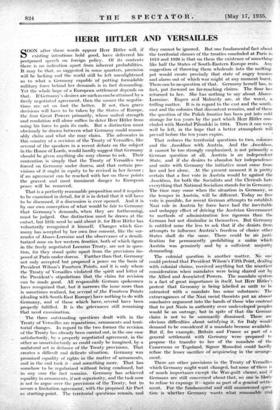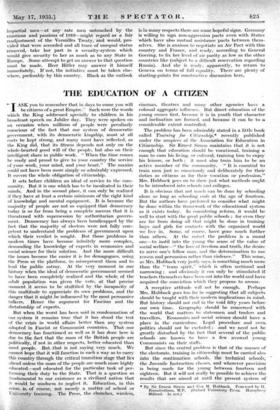HERR HITLER AND VERSAILLES
SOON after these words appear Herr Hitler will, if existing- intentions hold good, have delivered his postponed speech on foreign policy. Of its contents there is no indication apart from inherent probabilities. It may be that, as suggested in some quarters, precision will be lacking and the. world still be left unenlightened as to what a Germany capable of putting formidable military force behind her demands is in fact demanding.
• Yet the whole hope of a European settlement depends on that. If Germany's desires are such as can be attained by a freely negotiated agreement, then the sooner the negotia- tions are set on foot the better. If not, then grave decisions will have to be taken by the States of Europe, the four Great Powers primarily, whose united strength and resolution will alone suffice to deter Herr Hitler from using his force to gain its ends. But a distinction must obviously be drawn between what Germany could reason- ably claim and what she may claim. The advocates in this country of a revision of the Treaty of Versailles, like several of the speakers in a recent debate on the subject in the House of Lords, would hardly suggest that Germany should be given anything she may choose to ask. Their contention is simply that the Treaty of Versailles was forced on Germany under duress, and that certain pro- visions of it ought in equity to be revised in her favour ; if an agreement can be reached with her on these points the gravest and most imminent danger to European peace will be removed., That is a perfectly reasonable proposition and it requires to be examined in detail, for it is in detail that it will have to be discussed, if a discussion is ever opened. And it is by our own conception of what would be fair to Germany ' that Germany's demands, when they are forthcoming, must be judged. One distinction must' be drawn at the outset, but little need be said about it, for Herr Hitler has voluntarily recognized it himself. Changes which Ger- many has accepted by her own free consent, like the sur- render of Alsace-Lorraine and the observance of a demili- tarized zone on her western frontier, both of which figure in the freely negotiated Locarno Treaty, are not in ques- tion, for they stand quite apart from the provisions im- posed at Paris under duress. Further than that, Germany • not only accepted but proposed a peace on the basis of -President Wilson's Fourteen -Points, and it is only where the Treaty of Versailles -violated- the spirit 'and letter of .the -President's stipulations that the claim for revision' can be made good. • All responsible German spokesmen have recognized that, but it narrows the issue more than is sometimes realized, for several of _the Fourteen Points _ (dealing with South-East Europe) have nothing to do with :Germany, and of thoSe which have, several have been :properly fulfilled. It is the grievances still remaining that -need examination. • • • • The three outstanding question's dealt with in, the Treaty of Versailles are reparations, armaments and terri- torial changes. In regard to the two former the revision of the Treaty has already been carried out, in the one case satisfactorily, by a properly negotiated agreement, in the other as unsatisfactorily as could easily be imagined, by a unilateral act in defiance of the Treaty provisions. That creates a difficult and delicate situation. Germany was promised equality of rights in the matter of armaments, and in the end took it—and something more. That has somehow to be regularized without being condoned, but in any ease the fact remains. Germany has' achieved equality in armaments, if not superiority, and the task now is not to argue over the provisions of the Treaty, but to secure a limitation agreement, with the proposed Air Pact as starting-point. The territorial questions- remain; and they cannot be ignored. But one fundamental fact about. the territorial clauses-of the treaties concluded at Paris in 1919 and 1920 is that on them the existence of something like half the States of South-Eastern Europe rests. Any suggestion of throwing them wholesale into the melting- pot would create precisely that state of angry 'tension and alarm out of which war might at any moment burst. There can be no question of that. Germany herself has, in fact, .put forward no far-reaching claims. The Sitar has returned to her. She- has' nothing to say about Alsace- Lorraine. Eupen ar.d Malmedy are, at the worst, a trifling matter. It is in regard to the east and the south- east and the colonies that discontent remains, and of these the question of the Polish frontier hat been put into *cold storage for ten years by the pact which Herr Hitler con- cluded with Marshal-Pasudski in 1934. There it can very well be left, in the hope that a better .atmOsphere will prevail before the ten-years expire.
That reduces the territorial questions to two, colonies and the Ansel/fuss with Austria. And the Anschluss, it cannot be too strongly emphasized, is not primarily a German question at all. Austria. is an independent State, and if she desires to abandon her independence and unite with Germany the initiative must come from her and her alone. At the present moment it is pretty certain that a free vote in Austria would be against the Anschluss, for both the Socialists and the Clericals hate everything that National Socialism stands for in Germany. The time may come when the situation in Germany, or the temper in Austria, will be different. Today no 'free vote is possible, for recent German attempts to establish Nazi rule in Austria by force have had the inevitable and unhappy effect of driving the Austrian G-overmnent. to methods of administration' less rigorous than the German but not ditsimilar in themselves. But Germany is entitled none the less to ask that' if she desists from attempts to influence 'Austria's freedom of choice other States shall do the same. There could be nb justi, fication for permanently prohibiting -a union -which 'Austria ' was genuinely and by a sufficient' majority demanding. . The colOnial question is another matter. No one could pretend that President Wilson's Fifth Point, dealing with Colonial claims; received anything but the scantiest consideration • when mandates were being shared out by the Allied and Associated Powers. The mandate system is a -fact of great importance in itself, but Herr Hitler's protest that Germany is . being labelled as unfit to be entrusted with a • mandate has some substance: The extravagances of the Nazi racial, theorists put an' almost conclusive argument into the hands of those who 'contend that to put Nazis in authority over undeveloped- peoples would be an outrage, but "in spite of- that the Gentian claim is not to be summarily dismissed. There are obvious difficulties about satisfying it, for Italy Would demand to be considered if a mandate became available-.
But if, for example, Britain and - France as part of a general_ settlement with* Germany were. - prepared to propose the transfer to her of the mandate of the Catneroons or Togoland, Signor Mussolini could hardly refuse the lesser sacrifice of aeqUiescing in the arrange- ment.
There are other provisions in the Treaty of Versailles which Germany might want changed, but none of'them is of much importance except the -War-guilt clause, and if Germans are still concerned' about that, no one -is likely to refuse to expunge it—again as part of a-general settle- ment. For the fundamental and still unanswered ques- tion is Whether Germany wants_ what reasonable` and impartial men—at any rate men untouched by the emotions and passions of 1919—might regard as a fair readjustment of the Versdilles Treaty, and would, pro.- vided that were accorded and all trace of unequal status removed, take her part in a security-system which would give security to her as much as to any State in Europe. Some attempt to get an answer to that question must be made. Herr Hitler may answer it himself immediately, If not, the initiative must be taken else- where, preferably by this country. Black as the outlook is in many respects there are some hopeful signs. Germany is willing to sign non-aggression pacts even with States which have also mutual assistance pacts between them- selves. She is anxious to negotiate an Air Pact with this country and France, and ready, according to General Goering, to fix her level of air parity as low as the other countries like (subject to a difficult reservation regarding Russia). And she is ready, apparently, to return to Geneva on terms of full equality. There are plenty of starting-points for constructive discussion here.











































 Previous page
Previous page